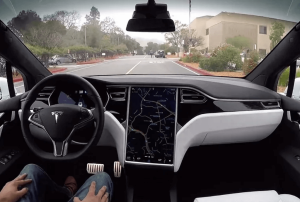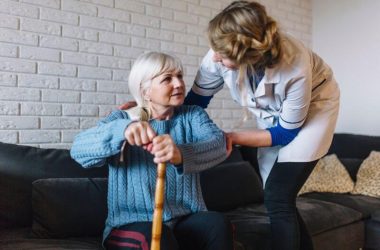When your seniors are on their own, they can greatly benefit from the newest Artificial intelligence (AI) technology to help manage their care and well-being optimally.
Even if the are technologically averse or uncomfortable using AI, you can help them get used to it and demonstrate how they can use it easily and explain their benefits.
Starting with everyday interactions, many seniors are already using AI without perhaps realizing it. They might be talking to Google on their smartphones, checking missed calls, using video calling apps, or watching television on smart TVs. With built-in AI features like Google voice-activated commands or Alexa assistant on the smart television, there is no need to fiddle with buttons on a remote control.
This is a perfect opportunity for you to guide them on how to utilize these tools effectively.
Here are some ways that seniors can get help through AI:
AI Devices that help optimizing Health Care
AI has seemingly unlimited potential in health care. For example, many wearable devices like smartwatches already exist and, if you can get your senior to wear one and show him how it works, the senior can track many vital parameters simply by wearing the watch.
This kind of biometric data can help nip health issues in the bud.
The smartwatches can be set to send reminders regarding medications, drinking water, eating, and other activities of daily life to the senior who has cognitive or memory issues.
They act like personal guides, telling them to take their medicines on time, reducing the risk of problems associated with missing doses or taking double the dose.
When you use AI for this, the AI can sense if something is wrong and send you an alert or even call for help.
Google’s Fitbit is developing generative AI for watches (like Pixel Watch) that keep track of various health and fitness parameters. Apple’s Siri can answer health related questions and the company is already working on an AI based health coach. Samsung is also working on adding more AI features to its range of smartwatches.
In addition to wearable technology, servicess like Amazon’s “Alexa Together” provide a remote caregiving assistant that connects the senior with his caregiver, send alerts to caregiver and provides a direct line for emergency assistance, all through voice commands.
And that’s not all, the progress is ongoing. For instance, researchers at the University of Waterloo have developed an AI-powered system that uses low-power millimeter-wave radio systems to monitor elderly people’s activities in their living spaces continuously and unobtrusively. This system can track activities like sleeping, eating, and the frequency of bathroom use without the need for any wearable device.
This is an early detection of health issues and an important alert healthcare workers to emerging problems such as mobility decline or the increased likelihood of falls, all without compromising privacy.
This technology represents a significant leap forward by providing caregivers with reliable, remote monitoring capabilities

- Make calls
- Order groceries or food
- Play music
- Switch channels on television
- Give information about the latest news or weather updates
- Answer queries
- Control lights
- Change thermostat settings
- Set alarms and reminders
- Schedule medical appointments
- Help manage chronic health problems
- Enter medical data using voice alone on the phone, laptop, or healthcare provider
These are especially useful for seniors who may have mobility issues, as these are all voice-activated.
Please check the following video to learn how seniors can profit from Alexa Assistant easily :
Learn How Seniors Can Benefit from AI Assistants
This video provides a practical demonstration of how seniors can use AI assistants like Alexa to make their daily lives easier and more enjoyable. From setting reminders to fetching the latest news, discover how AI can enhance the independence and well-being of the elderly.
Smart AI Solutions that improve Home Security :
Seniors who live alone are at a greater risk for property crime. Secure alarm systems, with AI based outdoor and indoor cameras, may act as a deterrent and keep the seniors safe.
If your senior has mobility or other health issues, you can consider GPS trackers, which also work using AI. While the smartphone usually has a GPS tracker, you may want an additional alert system if your senior does not use a smartphone or forgets where it is.
If you set up cameras and sensors at home, it is possible to track the senior’s movements and keep a watch on them. As long as it is not an intrusion on privacy, and it is meant for the senior’s safety, this is easy to do and you can keep an eye on them remotely.
Many AI-enabled devices can help if your senior faces any adverse event like a fall, or there is a fire, water leakage, or any natural disaster. These can be set up to send alerts directly to emergency services, the police, firemen, medical services, and others.
CCTV Monitoring App For Senior Fall & Injury Detection, Medical Emergency Response, Elder Abuse Detection To Give Caregivers A Virtual Presence No Matter Their Physical Availability
The Apple Watch Series 4 to 7 has a fall detection capability. If the senior falls and does not tap the screen (to signal OK) or slide it (to signal help needed) within 30 seconds an alelrt will be sent to the emergency contact along with the location.
Samsung also has as similar feature on its Galaxy models 3 to 5. Garmin is another manufacturer of smartwatches that can send alerts to an emergency contact if there is a change in movement or impact (such as a fall).
AI robots ( and assistants ) for Household Management
AI-powered devices are already available and these help to keep the house clean. Using in-built sensors, navigation, and mapping techniques, robotic vacuums can keep the house clean. Most can dock themselves so that they are always charged.
These house vacuum cleaners are a boon for the elderly, who struggle to keep the house clean. As of now, these may not be 100% effective, but still, they do a good enough job.
Voice-activated assistants are easily customizable regarding cleaning schedules and tasks. They can also be set to avoid certain areas as needed.
A large variety of robot vacuum cleaners are available that can navigate the house expertly (after learning and mapping initially). Some come with self-emptying dustbins and others with mops as well.
Moreover, recent advancements in robotics have introduced more sophisticated robots capable of handling a variety of household tasks beyond cleaning. For instance, the Tesla Optimus and Dobb-E robots are being developed to perform tasks from folding laundry to sorting items and even performing delicate operations like loading dishwashers without damage.
These robots are equipped with AI that enables them to learn from real-world data. Such capabilities show promise for future robots to take over more complex chores in household management. Companies like Dyson and Sanctuary AI are pushing the boundaries further by developing robots that can mimic human dexterity and sensitivity.
AI to keep Seniors connected in Social Life
Many times seniors get isolated and feel alone. Thanks to various AI technologies, seniors can join virtual communities (if they are unable to get out of their homes), have increased interactions with family members who may live far away, and make new friends by becoming active on various forums and websites.
They can even chat with their AI devices like Amazon’s Alexa, as one of the best conversational assistants .
While this is not the same as physical meetings, it is better than being lonely and perhaps feeling abandoned. Seniors can have something to look forward to if they set up a routine to virtually meet people, play games online, or do things together, which they could not do alone. AI can help enhance cognitive function in seniors who are aging.
To go out, seniors who have driving difficulties can opt for self-driving cars.

In the not-too-distant future, seniors may get affordable humanoid robots to act as companions and caregivers for them so that there is always someone near them.
As we’ve outlined, numerous AI and smart devices are available that you can implement to assist seniors.

Smiti is a web content writer, journalist, book author, and dietitian whose work has appeared in Tribune India, Apollo Life, Indian Express, Women’s Era, and other print and digital publications. She transitioned from writing for the print media to web content writing and has ghost-written various kinds of content in a variety of niches.








